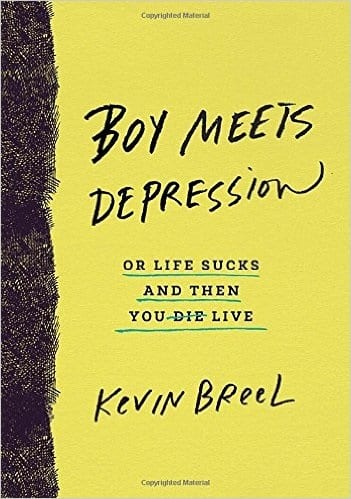In May of 2013 a Canadian comic named Kevin Breel gave an 11-minute TEDx Talk that went instantly viral with more than 3 million views to date. Two big things about the speech “Confessions of a Depressed Comic” account for its success: the speaker’s age and the message he delivered.
Kevin might downplay the significance of age. But the world had never seen a 19-year old speak on a topic as heavy as suicidal depression with such passion, poise, intelligence and self-awareness. His eloquence and youth make the second big thing, his message, all the more rousing. That a young, good-looking, apparently happy kid from the suburbs could have faced a near daily struggle with depression and the urge to kill himself was startling to many viewers. That was the point. He didn’t look depressed.
Nothing drives home the message that mental health disorders can affect anyone better than seeing Kevin Breel up on stage talking about his personal struggles. Now he has written a book, released last month, which tells the same story, but with greater depth and different lessons.
Kevin’s book Boy Meets Depression (Or Life Sucks and Then You Live) contains some of the most eloquent and powerful descriptions of depression written since Andrew Solomon’s The Noonday Demon: An Anatomy of Depression. It is also a deeply personal account.
The 2013 TEDx Talk was mostly a call to action: Kevin challenging us to cast aside our misconceptions about depression to form a better understanding of the people who experience it. If the TEDx Talk was an appeal to society, Boy Meets Depression is more like an individual user’s guide to surviving depression – whether we live with depression ourselves, love and live with someone else who has it, or just plain live as human beings. There is even a “Notes to Self” section at the end of each chapter which summarizes personal lessons learned at each stage of Kevin’s life. Some are funny: “Therapy is kind of like the first time you have sex, minus all the stuff that makes sex cool.” Others get right to the point: “When you feel f***ed up: Stop. Breathe. Talk to Someone.”
As a writer, I was especially drawn to the theme of storytelling in Kevin’s life. In the TEDx Talk he mentions his near brush with suicide. One night at the age of 17, worn down by his depression, he decided to end his life. He set about writing a letter to his mother and sister explaining his decision and apologizing for the impact it would have on them.
Putting those words on the page… is unquestionably the very thing that saved it. For the first time, all this stuff wasn’t just somewhere inside of me. It was out. And it hit me right then that this piece of a paper was just a story.”
Writing the letter may have been what saved his life, but it’s not what made him whole again. That took another kind of story, which he describes in the next to the last chapter of the book. There he writes of finding his “own subplot in the much bigger story of life.” Kevin starts to get better when he realizes “You are not the big story. Life is the big story.”
The final chapter of the book is titled “Thinking Better Thoughts” and it touches on how the way we think about ourselves, our feelings and our thoughts impacts our mental health. Earlier in the book he gives an example of the twisted logic of depression which leads him to the conclusion that eating is pointless because even after preparing and devouring the most delicious meal in the world, he will be hungry again in another five hours and still be left with all the dirty dishes.
This kind of negative thinking (known in cognitive behavior therapy as “cognitive distortion”) is common with depression. The problem Kevin describes is that even when a person is aware that this is happening, “you probably no longer have the optimism required to create a change in your life.” He describes the suicide experience as his “reaching bottom” moment. In that moment he found what he describes as an “invitation” – the opportunity to look at his depression as something inside him, rather than a world of pain and fear that he would always be a part of. Passages like this one reach beyond the merely autobiographical to emotional and literary truth.
I felt that, too, in his musings on story as a metaphor for life. Kevin Breel is a gifted storyteller, as anyone can see from his viral TEDx Talk. The suicide letter he writes and never acts on is another kind of story. As I read the final pages of Boy Meets Depression I wondered if the letter was in some ways symbolic of a killing of his ego which allowed Kevin the person to go on living. It is a new Kevin with new found maturity, “thinking better thoughts,” who declares at the end of the book that ‘you are not the story, life is the story.’
Subscribe to our e-newsletter for more mental health and wellness articles like this one.
SUBSCRIBE NOW
To purchase the books mentioned in this article click the links below:
Your purchases of these items on Amazon.com will help support the costs of running rtor.org, a free service of Laurel House, Inc., 501 (C)(3), non-profit organization.
Boy Meets Depression: Or Life Sucks and Then You Live
The Noonday Demon: An Atlas of Depression
Recommended for You
- Silver Hill Hospital: My Family’s 35-Year History with a National Leader in Quality Mental Health Care - February 7, 2023
- Connecticut Mother Who Lost a Son to Overdose Shares Her Story and Hosts Wilton Fundraiser to Benefit Laurel House - November 9, 2022
- Laurel House Offers $10,000 Racial Equity Scholarship for a Black or Hispanic Student Pursuing a Master’s of Social Work Degree - June 8, 2022








What an amazing young man! Really brave to share his story and he did it by moving seamlessly between humor and weighty subject matter. He had such great insights for a man of his age. Really glad to have the opportunity to hear him speak!
Kevin gave a wonderful speech and his ability to present a serious topic with moments of humor was very engaging. I can see why his message spread so quickly. So glad I was able to attend!
I really enjoyed the evening. Kevin’s humor and insight are so captivating that it would be hard to come away from the evening unmoved. The service that he is doing for the mental health community and especially young adults by sharing his heartfelt story is extremely powerful. Thank you Laurel House for bringing Kevin’s story to Connecticut.
So happy I received the invitation to attend Kevin’s presentation. His message is so important and it is vital for young adults to hear it in order to save lives. My daughter suffered from depression, and was one of those in the statistic of a million, that Kevin mentioned repeatedly that did not make it. She took her life at 14 years of age. He is relatable and by infusing humor into such a difficult subject matter keeps the attention of his audience, particularly the young ones.
Several high school students attended the presentation with a group of us from an organization called Brookfield Cares, whose goal is to raise awareness about mental health issues. They were all moved by Kevin’s talk and want to bring him
to our community for a presentation.
Debbie thank you so much for courageously sharing and I am deeply sorry to hear about your daughter. The Kevin Breel event was very meaningful, and I am delighted to hear that a group of your students were moved by Kevin’s talk. I agree with you his humor and ability to connect with the audience in a very authentic and personal way will hopefully lead to more young people getting help earlier.
I am also quite impressed with your students’ commitment to raise awareness of mental health through Brookfield Cares. These students are exceptional and please let them know that Resources to Recover is a resource for them.